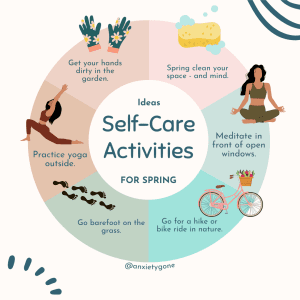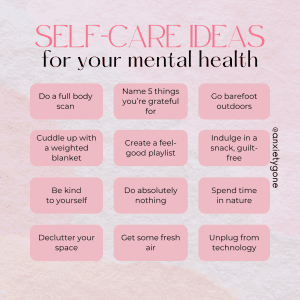Full Disclosure: Clicking on these links could mean a tiny commission for me, at no extra cost to you.
Imagine waking up on a Sunday morning, the sunlight gently streaming through your window, and the day ahead is entirely yours to enjoy. No deadlines, no meetings—just pure, unadulterated “you” time. This is the essence of Self Care Sunday, a special day (or portion of the day) dedicated to nurturing your mind, body, and spirit. Whether you’re soaking in a warm bath, journaling your thoughts, or taking a calming walk in nature, Self Care Sunday is all about indulging in activities that make you feel good and recharge your batteries for the week ahead. So, let’s dive into how you can transform your Sundays into a sanctuary of self-care and happiness!
What is Self Care Sunday?
Self Care Sunday is all about hitting the pause button on the stress and busyness of life to carve out some quality “me time” every Sunday. It’s your weekly mini-vacation where you indulge in self care activities that help you relax, recharge, and become the best version of yourself. Think of it as your personal reset button – decompressing from the week’s chaos and stepping into the new week with a refreshed spirit and a positive mindset.
The Importance of Self Care
Self-care is crucial for maintaining mental, emotional, spiritual and physical health. By committing to self-care Sunday or just regular self-care practices, you can prevent burnout, enhance physical health, and improve mental health.
According to the World Health Organization (WHO), self-care activities even help prevent disease, maintain health, and manage illness, contributing to a longer, healthier life 1
By practicing regular self-care activity, you can make sure you enough battery to keep up. It’s about maintaining and protecting your health on all levels to ensure you have many years to come, and that you can enjoy them as they’re here. Self care Sunday is like investing in your health, as well as in your ability to handle life’s challenges with greater resilience and joy.
The Importance of Self Care Sunday for Mental Health
Self Care Sunday is particularly vital for mental health, offering a dedicated time to unwind and focus on your personal well-being. This practice helps alleviate symptoms of stress, anxiety, and depression by providing a break from the constant demands of everyday life. It’s so important that the World Health Organization even says regular self-care practices are crucial for maintaining mental health and preventing burnout 2.
Similarly, the American Psychological Association confirms that self-care can enhance mood and overall mental health, making it an essential part of a balanced life 3.
Some specific benefits for your mental health that you can expect from practicing self care activities are:
- Lower stress levels
- Decreased anxiety and depression
- Improved mood
- Stabilized mood
- Increase in overall happiness
- Prevent burnout
- Better emotional regulation
- Improved emotional stability
- Increased confidence
- Better decision making
- Increased self-esteem
- More resilience
- Reduced tension
Ready to take control of your mental health
The Mindfulness app offers guided meditations, stress relief techniques, and personalized plans to help you stay calm and focused. For a limited time, enjoy an exclusive discount just for our readers!
Don’t miss out – anxiety relief is just a tap away!
Benefits of Self Care Sunday
Prioritizing Self Care Sunday gives you the opportunity to completely transform your week, simply by investing in your own wellbeing and turning your Sundays into a haven of relaxation and rejuvenation. Here are some soothing benefits you can expect to receive from your soothing self care activities:
1. Stress Reduction
Self Care Sunday is your ticket to stress reduction. Engaging in activities like soaking in a warm bath, practicing yoga, or simply lounging with a good book helps lower cortisol levels, the body’s primary stress hormone. According to a study by the American Psychological Association, regular relaxation practices can significantly reduce stress and improve mood 4.
2. Enhanced Physical Health
Think of Self Care Sunday as your personal wellness retreat. Whether you’re going for a jog in the park, cooking a nutritious meal, or catching up on sleep, these self care activities boost your physical health. And as we already know, regular exercise, even if it’s just a walk around the neighborhood, enhances cardiovascular health and boosts your immune system. Many health professionals believe that active self-care activities like these are fundamental to maintaining physical health 5.
3. Improved Mental Health
Self Care Sunday is like a mental decluttering session. Activities such as meditation, mindfulness, and creative hobbies help clear your mind and improve mental clarity. The World Health Organization emphasizes that self-care can alleviate symptoms of anxiety and depression, while also helping to improve your overall mental health 1.
4. Boosted Productivity
Here’s the fun part: taking time off actually makes you more productive! Self Care Sunday acts as a reset button, refreshing your mind and body for the week ahead. After a day of relaxation, you’ll find that you can tackle Monday’s challenges with renewed vigor and focus. Research shows that people who take regular breaks and prioritize self-care are more efficient and less likely to experience burnout 4.
5. Increased Self-Awareness
Imagine spending a day tuning into your own needs and desires, without the distractions of daily life. Self Care Sunday promotes self-awareness, helping you understand what makes you truly happy. This self-awareness can lead to more fulfilling decisions in both your personal and professional life. When you know yourself better, you can navigate life’s ups and downs with greater ease.
6. Strengthened Relationships
When you’re well-rested and content, you’re a better friend, partner, and family member. Self Care Sunday gives you the energy and positivity to nurture your relationships. Whether it’s spending quality time with loved ones or setting healthy boundaries, self-care enhances your social connections. A happy you means happier relationships all around.
7. Long-Term Health Benefits
Think of Self Care Sunday as an investment in your future. Regular self-care practices can prevent chronic illnesses and promote longevity. By taking care of yourself today, you’re setting the foundation for a healthier tomorrow.
7. Promotes Longevity
According to the World Health Organization (WHO), engaging in self-care activities is essential for promoting health and longevity. Self-care helps prevent disease, maintain health, and cope with illness. By investing in self-care, you’re investing in a longer, healthier life.
8. Boosts Confidence and Self-Esteem
When you make self-care a priority, you send a message to yourself that you are valuable and deserving of care. This boosts your confidence and self-esteem. Feeling good about yourself and taking pride in your well-being can have a profound impact on your overall outlook on life.
9. Encourages Balance
Life is all about balance. Self-care helps you create a healthy balance between work, responsibilities, and leisure. It ensures that you’re not neglecting any aspect of your life and that you’re taking time to enjoy the things you love.
10. Builds Resilience
Engaging in regular self-care activities builds resilience, enabling you to handle life’s challenges more effectively. When you’re well-rested, healthy, and emotionally balanced, you’re better equipped to cope with stress and bounce back from adversity.
9 Self-Care Activities to Boost Your Mental Health
Spring invites us to shed the old and embrace the new, offering a chance to reassess and refresh our mental health practices with some new self care activities. Now, you can certainly pick your own activities and hobbies that align with your current interests and mood. However, we’ve also created a list of spring activities perfect for self-care this season that are definitely worth investing your time in.
1. Outdoor Adventures for Emotional Rejuvenation
The benefits of spending time in nature are well-documented, and spring is the perfect season to explore the outdoors. Nature walks and gardening not only provide physical activity but also offer a sense of peace and connection to the world around us. In fact, research shows that some soil microbes have effects comparable to Prozac, a common antidepressant medication.
Getting your hands dirty in the garden can also increase serotonin levels, as research has shown contact with soil and a specific soil bacteria, Mycobacterium vaccae, triggers the release of serotonin in our brain. So, grab your gardening gear and start digging for an extra boost of natural anxiety relief and depression treatment.
Gardening not your thing? Take advantage of the pleasant weather and practice yoga or meditation outdoors. Find a quiet spot in nature, such as a park or garden, and let the sights and sounds help you relax and rejuvenate.
Explore local trails or nature reserves. Walking amidst greenery and blooming flowers can be incredibly calming and grounding. Don’t forget to breathe deeply and notice the beauty around you.
Or pack a delicious meal and head to a nearby park for a picnic. Invite friends or family to join you, or simply enjoy some solo time in the great outdoors. Take the opportunity to unwind, savor your food, and soak up the sunshine.
Nature is your playground. Have some fun with it as you practice your self care.
2. Mindful Meditation and Spring Awakening
Incorporating mindfulness and meditation into your routine can enhance your connection to the present moment, reducing stress and anxiety. Practicing these outdoors in spring will further boost the benefits , as the natural beauty and sounds add an extra layer of tranquility.
3. Creative Expressions of Self-Care
Engage in creative activities that uplift your spirits, such as painting, drawing, writing, or crafting. Let your imagination soar and express yourself freely without judgment. Remember to let go of perfectionism and embrace the process of creating without judgment or self-criticism. Allow yourself to make mistakes, experiment with new techniques, and explore your creativity without worrying about the end result.
To maximize the effects of this self care activity for your mental health, use your creative expression as a tool for processing and expressing your emotions. Channel your feelings into your artwork, allowing them to flow freely without inhibition. Use colors, shapes, and symbols to convey the depth of your inner experience. Explore art therapy techniques to enhance your mental health and well-being. Use drawing, painting, journaling, or other creative activities to process trauma, reduce stress, manage anxiety, and improve mood.
4. Physical Wellness and Nutrition
Spring is a great time to refresh your diet and integrate more physical activity into your routine. Give some seasonal foods a try and take advantage of the weather to exercise outdoors can have a profound impact on your physical and mental health.
Pay attention to what you eat and how it makes you feel too. Choose nourishing foods that support your well-being, and practice mindful eating by savoring each bite and tuning into your body’s hunger and fullness cues.
5. Spring Cleaning
Decluttering your living space can have a positive impact on your mental health. Take some time this season to clear out unnecessary items and organize your surroundings. As you declutter your home, you’ll also be decluttering your brain and creating a sense of order and calm.
Not sure where to start? This online Declutter Fast guide walks you through spring cleaning, making it fun and therapeutic.
6. Spring Into Positivity with Affirmations for Mental Health
Self care activities in spring don’t have to require too much time and energy. Something as simple as repeating affirmations each morning can make a significant impact on your mental health. So, as the flowers bloom and the world awakens, let’s nurture our minds with affirmations that reflect the renewal and growth of spring.
Here are affirmations to infuse your days with hope, strength, and positivity:
- “With each blooming flower, I am reminded of my own growth and resilience.” ????
- “I welcome the new beginnings that spring brings into my life.” ????
- “Just like the earth, I am full of endless possibilities and beauty.” ????
- “I release old fears and embrace the fresh start this season offers.” ????
- “I am rooted in strength, and I rise towards the sunlight of my highest potential.” ????
- “Every day is a chance to bloom into a happier version of myself.” ????
- “I am in harmony with the cycles of nature, finding balance in renewal and growth.” ????
- “I allow joy and positivity to flow into my life like a spring river.” ????
- “This season, I plant seeds of self-love and watch them flourish.” ????
- “I am nurtured by the warmth of the sun and the love I have for myself.” ☀️
7. Let the Fresh Air In
Let in the fresh air and sunshine. It’s a simple act that can dramatically improve your indoor environment and your mood. Research shows that your physical health will benefit from open windows, as well as your mental health. Air quality has the power to improve our moods and allow our brains to function better.
8. Connect with Friends
Although this self care activity might be difficult for those with social anxiety, it’s important not to avoid it altogether. Spring is a wonderful time to strengthen bonds with friends and family or seek out new connections. Social support is a vital component of mental health; engaging in shared activities can enhance feelings of belonging and community.
Many communities offer wellness events in spring, such as group hikes, outdoor or online yoga classes, or mental health workshops. Participating in these can provide a sense of community and introduce new self-care practices.
Not ready to dive right into social activities? Online group therapy can give you the sense of community and support, while also offering you virtual guidance that can help you overcome anxiety.
9. Do a Digital Detox
Then, set up your physical environment to support your digital detox. Consider removing temptation by keeping devices out of sight or in a designated “tech-free” zone. Use this opportunity to declutter your digital space by organizing files, deleting unused apps, and unsubscribing from unnecessary emails.
Tap Into Anxiety Relief Right Now
→ Mindfulness Meditation: Gain access to over 2000 guided meditations, stress relief techniques, and personalized plans to help you stay calm and focused. Get Started
→ Breathwork: Receive guided breathwork sessions designed to reduce stress and enhance your well-being. Get Started
How to Create Your Self Care Sunday Plan
Understanding your unique mental health needs is the first step towards crafting a personalized self-care plan. This involves reflecting on what aspects of your mental health require the most attention and what self care activities bring you joy and relaxation.
Here’s how you can start:
- Set a Time: Dedicate specific hours each Sunday for self-care.
- Choose Activities: Select a variety of self care activities that address different aspects of well-being.
- Stick to the Plan: Consistency is key to making self-care a habit.
It’s also important to set achievable goals. Whether it’s dedicating a certain amount of time each day to mindfulness or committing to a weekly outdoor activity, establishing clear, manageable objectives can help maintain focus and motivation.
Example Self Care Plan
Creating a Self Care Sunday routine involves identifying activities that bring you joy and relaxation. However, if you need some guidance, here is an example self care Sunday plan to get you started.
Week 1: Mindfulness and Reflection
- Daily Meditation: Dedicate a few minutes each day to practice mindfulness meditation. Focus on your breath, observing thoughts as they come and go without judgment.
- Gratitude Journaling: Start a gratitude journal and write down three things you’re grateful for each day. Reflecting on positive experiences can shift your perspective and promote feelings of contentment.
- Digital Detox: Set boundaries with technology by unplugging for at least an hour each day. Use this time to engage in activities that nourish your soul, such as reading, spending time in nature, or connecting with loved ones face-to-face.
Get ready for week 1 and download the #1 mindfulness app here.
Week 2: Physical Well-Being
- Exercise Routine: Incorporate regular physical activity into your daily routine. Whether it’s a brisk walk, yoga session, or dance class, moving your body releases endorphins and reduces stress.
- Healthy Eating Habits: Focus on nourishing your body with wholesome foods. Incorporate plenty of fruits, vegetables, lean proteins, and whole grains into your meals to support overall well-being.
- Adequate Sleep: Prioritize quality sleep by establishing a consistent bedtime routine. Aim for 7-9 hours of sleep each night to enhance cognitive function and mood regulation.
Week 3: Connection and Support
- Social Engagement: Nurture your relationships by reaching out to friends and family members. Schedule virtual hangouts or outdoor activities to foster a sense of connection and belonging.
- Therapy or Support Groups: Seek professional support if you’re struggling with your mental health. Therapy sessions or online support groups provide a safe space to explore your emotions and develop coping strategies.
- Acts of Kindness: Practice random acts of kindness to uplift others and boost your own well-being. Whether it’s volunteering, donating to charity, or simply offering a listening ear, spreading kindness fosters a sense of purpose and fulfillment.
Week 4: Creativity and Self-Expression
- Creative Outlets: Engage in activities that ignite your creativity, such as painting, writing, or crafting. Expressing yourself creatively can reduce stress, enhance self-awareness, and foster personal growth.
- Mindful Movement: Explore mindful movement practices like tai chi or qigong to cultivate a deeper connection between your mind and body. These gentle exercises promote relaxation and improve overall balance.
- Self-Compassion Practice: Be gentle with yourself and practice self-compassion daily. Treat yourself with the same kindness and understanding you would offer to a friend, acknowledging your worthiness and inherent value.
FAQs about Self Care Sunday
- What are the best outdoor activities for improving mental health in spring?
There are numerous outdoor activities that can significantly improve mental health during the spring season. Here are some of the best ones: walking or hiking, cycling, gardening, outdoor sports, picnicking, birdwatching, kayaking or canoeing, nature photography and stargazing. - What is Self Care Sunday?
Self Care Sunday is a dedicated day each week where individuals focus on activities that promote relaxation, rejuvenation, and overall well-being. It’s a time to step away from the stresses of daily life and engage in practices that nurture the mind, body, and spirit. - How can I start a Self Care Sunday routine?
Starting a Self Care Sunday routine involves setting aside specific time each Sunday for self-care activities. Begin by identifying activities that bring you joy and relaxation, such as reading, meditating, exercising, or spending time in nature. Make a plan and commit to sticking to it every week. - What are some self care activities I can do on Self Care Sunday?
There are numerous self care activities you can do on Self Care Sunday, including: taking a long bath, practicing yoga, meditating, journaling, reading, walking in nature, cooking a healthy meal or simply doing a hobby you enjoy. - How does Self Care Sunday improve mental health?
Self Care Sunday improves mental health by providing a regular opportunity to de-stress and focus on personal well-being. Activities like mindfulness, relaxation exercises, and hobbies can reduce anxiety, boost mood, and enhance emotional resilience, contributing to better overall mental health. - Can busy individuals benefit from Self Care Sunday?
Absolutely! Even busy individuals can benefit from Self Care Sunday. It’s about finding small pockets of time to dedicate to self-care, whether it’s 10 minutes of meditation in the morning, a short walk in the afternoon, or reading a book before bed. The key is consistency and making self-care a priority, no matter how busy you are.
Final Words on Self Care Sunday
Self-care is not a luxury; it’s a necessity. It’s an essential practice that supports your physical, mental, and emotional health. By making self-care a priority, you can improve your overall quality of life, enhance your well-being, and approach life’s challenges with greater strength and positivity. So, take the time to care for yourself—you deserve it!
Self Care Sunday Infographics
References:- World Health Organization. “Self-care for health: a handbook for community health workers & volunteers.” 2013. Available at: https://www.who.int/publications/i/item/9789241548267
- World Health Organization. “Self-care for health: a handbook for community health workers & volunteers.” 2013. Available at: https://www.who.int/publications/i/item/9789241548267
- American Psychological Association. “The Importance of Self-Care.” 2020. Available at: https://www.apa.org/news/podcasts/speaking-of-psychology/self-care
- American Psychological Association. “The Importance of Self-Care.” 2020. Available at: https://www.apa.org/news/podcasts/speaking-of-psychology/self-care
- Mayo Clinic. “Self-care: How to take charge of your health.” 2021. Available at: https://www.mayoclinic.org/healthy-lifestyle/adult-health/in-depth/self-care/art-20045395











